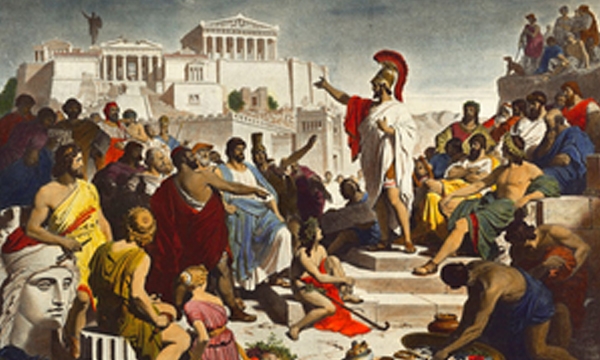How alliances made Athens great?
In his declared intention to “Make America Great Again,” President Donald Trump appears set on destroying the foundations of American greatness.
The multinational organizations and agreements that established peace and stability, and encouraged economic growth for some seven decades, were designed principally by Americans. They organized the world pretty much the way that suited them, and they reaped the benefits of dominating it through a complex network of organizations and treaties.
On a global scale, this postWorld War II American hegemony echoed the way that ancient Athens, after leading a victorious alliance of Greek city-states against a Persian invasion, gradually shaped the alliance into an empire. The Athenians of the fifth century BC took charge of the Greek states’ defense, controlled their diplomatic and trade relations and intervened in their politics.
An enigmatic figure from that time known only as the Old Oligarch, because of his blunt critique of democratic Athens, was very clear in his writing about what he did not like about the city’s constitution and its citizens’ behavior. Unlike Trump, however, he understood that the Athenians had gained much by rigging the Greek world in their favor.
“I do not think well of their constitution,” he wrote. “But since they have decided to have it so, I intend to point out how well they preserve it and how they accomplish those other things for which the rest of the Greeks criticize them. One must forgive everyone for looking after their own interests.”
In democracy, the Old Oligarch declared, the worst citizens had an equal say and could even be elected to office, at the expense of the city’s finest. Furthermore, as the economy boomed through the links of empire, some slaves and foreign residents had even become rich in trade and commerce. Slaves didn’t know their place, the Oligarch complained. You could not even beat them in the street. They dressed the way their masters did, and it was impossible to tell them apart.
The Athenians, he charged, bullied their allies, turning a defense agreement into an empire in whose center they sat, pulling all the strings. They drew tribute from their allies; they supported democrats against the best citizens to fit Athenian interests. “For like is well-disposed to like. Accordingly, the Athenians prefer those sympathetic to themselves,” the Old Oligarch noted.
With their powerful navy, the Athenians controlled their allies’ dealings, from politics to trade. They made their partners use Athenian currency, weights and measures. They obliged the allies to bring their legal issues to Athenian courts, where litigants had to win the favor of Athenian citizens who sat in judgment of them. “In this way, the allies have become the slaves of the Athenian people,” the Old Oligarch charged.
Scholars are uncertain of the date of the “Old Oligarch” text (originally attributed mistakenly to Xenophon of Athens). It may have been written before 431 B.C., when war broke out between Athens and Sparta, and certainly before 404, when the victorious Spartans imposed an oligarchy on Athens, tore down its walls and dismantled its alliance. (Less than a year later, after brutal oligarchic rule and civil strife had made the city ungovernable, the Spartans accepted a return to democracy in Athens.)
One year into the war with Sparta, in the prime of his city’s democracy and power, Pericles, the great Athenian leader, also expressed a composite view of his state’s policies: “In nobility of spirit, we stand in sharp contrast to most men; for it is not by receiving kindness, but by conferring it, that we acquire our friends,” the historian Thucydides quoted him as saying at a funeral of war dead. But Pericles was no softhearted liberal in the modern sense. His pursuit was Athenian greatness — and domestic and foreign policy contributed to this. Before succumbing to a plague that struck Athens during the war, he tried to encourage his fellow citizens.
“It will be remembered forever, how we of all Greeks held political opponent of democracy and the inspired rhetoric of its champion reveal that Athens had created a network of common interests among its citizens and with its allies, all of which it was able to manipulate to its own advantage.
Allied tribute helped fund the glorious temples whose ruins still grace the Greek capital; allied money and ships contributed to Athens’s naval might, which, in turn, helped the Athenians dominate their allies. In Thucydides’ analysis, it was this rise in influence that provoked Sparta to reassert its authority as the Greeks’ greatest power. After Pericles’ death, arrogance toward other states and recklessness contributed to Athens’ defeat. The Oligarch was given his catchy name a century ago by a prominent classicist, Gilbert Murray, at a time when the word was not synonymous with friends of Vladimir Putin or billionaires funding political campaigns. The name reflected the perennial tension in Athens and other city-states between the rule of the many and the rule of the few.
Unlike those who today try to manipulate politics to their ends, the Old Oligarch could appreciate the effectiveness of what he did not like. He knew that the common people had to have economic benefits and a say in the running of the state, because the state depended on them. “The people generally are right to have more than the highborn and the wealthy, because it is the people who man the ships and impart strength to the city,” he wrote.
Today, as Trump tries to roll back health care for a large part of the population, as he invests in domestic division and further economic inequality, as he undermines alliances and the international order, he seems blind to the value of what he does not like, indifferent to the consequences of his actions. Endowed with the immense powers of his office, he lacks the cynical Old Oligarch’s understanding of politics. Unlike Pericles, he does not see that power can be enhanced through the projection of kindness.
Related Posts

